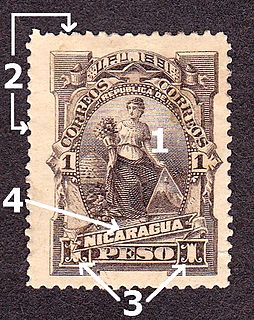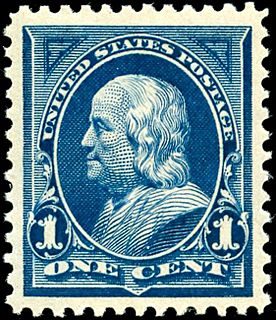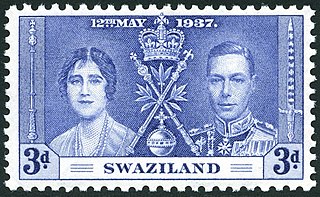This article may be expanded with text translated from the corresponding article in Dutch. (March 2021)Click [show] for important translation instructions.
|

Surpost, the Suriname Postal Corporation, is the national post office of Suriname.
This article may be expanded with text translated from the corresponding article in Dutch. (March 2021)Click [show] for important translation instructions.
|

Surpost, the Suriname Postal Corporation, is the national post office of Suriname.

A postage stamp is a small piece of paper issued by a post office, postal administration, or other authorized vendors to customers who pay postage, who then affix the stamp to the face or address-side of any item of mail—an envelope or other postal cover —that they wish to send. The item is then processed by the postal system, where a postmark or cancellation mark—in modern usage indicating date and point of origin of mailing—is applied to the stamp and its left and right sides to prevent its reuse. The item is then delivered to its addressee.

An overprint is an additional layer of text or graphics added to the face of a postage or revenue stamp, postal stationery, banknote or ticket after it has been printed. Post offices most often use overprints for internal administrative purposes such as accounting but they are also employed in public mail. Well-recognized varieties include commemorative overprints which are produced for their public appeal and command significant interest in the field of philately.

Postal service in the United States began with the delivery of stampless letters whose cost was borne by the receiving person, later encompassed pre-paid letters carried by private mail carriers and provisional post offices, and culminated in a system of universal prepayment that required all letters to bear nationally issued adhesive postage stamps.

Indian postal systems for efficient military and governmental communications had developed long before the arrival of Europeans. When the Portuguese, Dutch, French, Danish and British conquered the Marathas who had already defeated the Mughals, their postal systems existed alongside those of many somewhat independent states. The British East India Company gradually annexed the other powers on the sub-continent and brought into existence a British administrative system over most of modern-day India, with a need to establish and maintain both official and commercial mail systems.

This a survey of the postage stamps and postal history of the Russian Empire, the Soviet Union and the modern Russian Federation.

The French post offices in Zanzibar were post offices operated by France in Zanzibar from January 16 1889 to July 31 1904, when the United Kingdom took direct control of what had previously been a protectorate.
India Post is a government-operated postal system in India, part of the Department of Post under the Ministry of Communications. Generally known as the Post Office, it is the most widely distributed postal system in the world. Warren Hastings had taken initiative under East India Company to start the Postal Service in the country in 1766. It was initially established under the name "Company Mail". It was later modified into a service under the Crown in 1854 by Lord Dalhousie. Dalhousie introduced uniform postage rates and helped to pass the India Post Office Act 1854 which significantly improved upon 1837 Post Office act which had introduced regular post offices in India. It created the position Director General of Post for the whole country.

The Vatican post office has operated its own postal service and issued its own postage stamps since 1929.
Postal orders are currently issued in Gibraltar by the Royal Gibraltar Post Office.

This is a survey of the postage stamps and postal history of Serbia.

This is a survey of the postage stamps and postal history of Gibraltar.

The Gibraltar Study Circle is a global non-profit society based in the United Kingdom, founded by Walter (Wally) Jackson in 1975. Its aim is to expand the knowledge of the philately of Gibraltar, a British overseas territory located at the entrance to the Mediterranean Sea overlooking the Strait of Gibraltar. The study circle looks at the philately of Gibraltar in all its forms for the benefit of collectors (philatelists) from all walks of life. This includes studying the postal history, postage stamps, revenue stamps, postal stationery and associated overprints from Gibraltar and any of these used in Morocco. Any new information is shared with the membership via its quarterly journal, "The Rock", which has been published since 1975, showing articles of interest not only to philatelists but also historians, artists and sociologists.

Suriname, a former Dutch colony on the north-east coast of South America, has issued stamps since 1873. The earlier issues until it gained state autonomy in December 1954, mostly featured the head of the Dutch monarch on them. Suriname gained full independence in November 1975.

This is a survey of the postage stamps and postal history of Uruguay.

This is a survey of the postage stamps and postal history of the Netherlands.
This is a survey of the postage stamps and postal history of Nigeria.

This is an overview of the postage stamps and postal history of the Free City of Danzig .
The Kaluski Collection is a collection of stamps of Poland that forms part of the British Library Philatelic Collections. It was formed by Janusz Kaluski and donated to the library in 2003 and includes 46 volumes detailing the stamps and postal history material of Poland from 1835 to 2002.

On 6 July 1907 the British Central Africa Protectorate became the Nyasaland Protectorate and its first stamps were issued on 22 July 1908.

This is a survey of the postage stamps and postal history of Eswatini, formerly Swaziland.